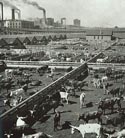The American Dream
These days I get the sense that when people use the phrase “American Dream” they tend to mean winning the lottery or a reality show or in some way realizing “the easy life” without having to earn it. Originally, though, it related more to the U.S. as a land of opportunity. It was definitely something you earned, but the possibility of class mobility existed here in a way that it didn’t anywhere else. If you worked hard enough and persevered, you could eventually go from a life of poverty to a more relaxed middle class life. It’s the drag-yourself-up-by-the-bootstraps mentality. Anything is possible if you just work at it hard enough.
So I think Sinclair is very deliberate about Jurgis’s pat response to every adversity at the start of the book: “I will work harder.” According to the American mythology, that will do the trick. But we see that Jurgis--and the whole family--works as hard as humanly possible only to find it’s not enough to save them. Their disadvantages are too great, the obstacles stacked against them too powerful, to simply be overcome by hard work. Sinclair uses Jurgis’s story to deconstruct the idea of the American Dream, to show that it is more myth than mythology. There is an element of truth to the concept, of course, but the reality is much more complex than the “blame the victim” approach that’s generally espoused.
(Or, as someone much less eloquent than Sinclair once said, the “American Dream is only a dream.”)
So I think Sinclair is very deliberate about Jurgis’s pat response to every adversity at the start of the book: “I will work harder.” According to the American mythology, that will do the trick. But we see that Jurgis--and the whole family--works as hard as humanly possible only to find it’s not enough to save them. Their disadvantages are too great, the obstacles stacked against them too powerful, to simply be overcome by hard work. Sinclair uses Jurgis’s story to deconstruct the idea of the American Dream, to show that it is more myth than mythology. There is an element of truth to the concept, of course, but the reality is much more complex than the “blame the victim” approach that’s generally espoused.
(Or, as someone much less eloquent than Sinclair once said, the “American Dream is only a dream.”)


0 Comments:
Post a Comment
<< Home